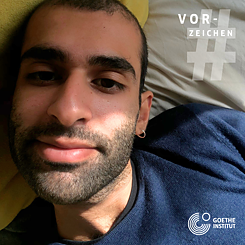Book Review #1
Armin reads SGL
First up is Armin with his review of Ich kann dich noch sehen (an diesen Tagen)/ Days you’ll find me (in a place I like to go) by Simoné Goldschmidt-Lechner. The book will be published on May 2, 2024 in a German-English version by Rohstoff, a publishing project by Matthes & Seitz.
Simoné Goldschmidt-Lechner already made a stir with the short, dense chapters and abstract figures of her debut novel Messer, Zungen [Knives, Tongues] (2022). Her bilingual novella Ich kann dich noch sehen (an diesen Tagen) / Days you’ll find me (in a place I like to go) is a quick read, almost a rushing current. We can turn the book and switch between German and English, and here, too (as with her debut novel), the author creates transatlantic networks of solidarity: the text highlights polyphony; it does not function in one single language.
Over seventy compact pages, we accompany Rahel to the police station where she reports a rape. Finn, her oldest and closest childhood friend is at her side. When Rahel hears piano music coming from the end of the hall, Finn takes her arm: the perpetrator is a pianist, and his melodies still follow her to the present day. In some passages, the author employs an unnamed narrative voice, sometimes fragmentary ideas, often it is the words of the perpetrator spoken at an unknown time. But this voice never seems to take up space; it remains Rahel who tells us her story. Together with the protagonist, we fantasize about tearing the keys from his piano, dangling them before him, and so taking back a bit of justice for Rahel. But the novella is also concerned with the protagonist’s discomfort, the experiences of seeking help from those who often leave racialized people in the lurch. Going back and reporting to the same police who took Finn away in handcuffs as a teenager. Rahel’s thoughts often return to the sixteen-year-old Mouhamed Dramé who was shot five times and murdered during a mental health crisis. Real victims become a part of the novella’s fabric, not merely through interpolation and asides: the testimonials of those who have experienced violence become part of Rahel’s story.
The criminalization of other victims shows the protagonist that the law does not mean justice. Alongside the perpetrator, Rahel also addresses the reader indirectly. She thinks people might wonder why she thinks more about Finn’s arrest during their youth after the rape than she does about the years that transpired after.
SGL’s novella inspires fascination because she manages to combine serious topics like sexualized violence and racist police brutality in a short narrative and still do justice to them both while also asking critical questions about forms of both resistance and guilt. The text criticizes society’s tendency to place the blame for violence back on the bodies of marginalized victims and is a return to the essentials: siblinghood.






